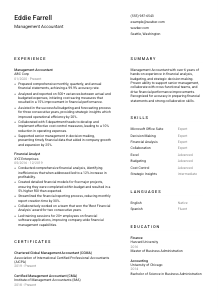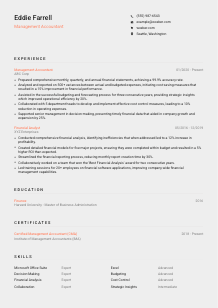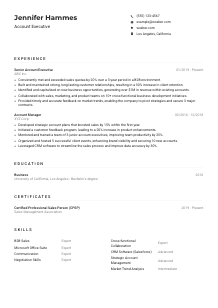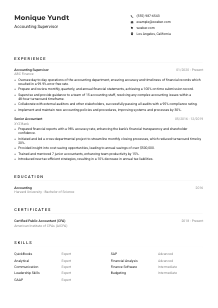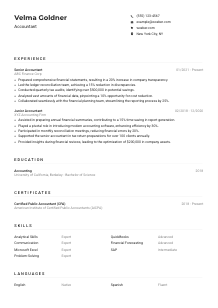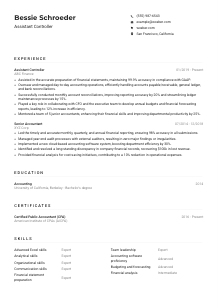Management Accountant CV Example
Balancing spreadsheets, but your CV doesn't add up? Delve into this Management Accountant CV example, harmonized with Wozber free CV builder. Discover how you can formulaically communicate your financial acumen to align with job goals, ensuring your career ledger stays consistently in the black!
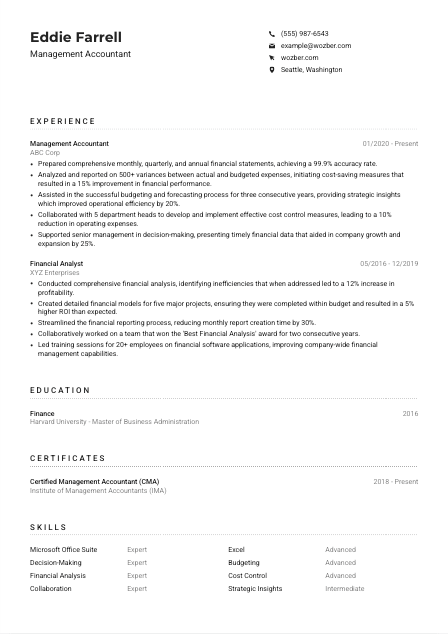
How to write a Management Accountant CV?
Hello, future Management Accountant superstar! In a realm where numbers tell stories and financial insight drives business strategy, your CV is not just a document—it's your narrative in the competitive world of finance. Sparked with insights and leveraging the power of the Wozber free CV builder, this guide doesn't just tell you how—it invites you on a strategic journey to design a CV that speaks volumes.
Tailored specifically for a Management Accountant role, it's time to translate your expertise onto paper with an approach that's not just about meeting criteria, but about exceeding expectations. Let's decode the art and science behind a CV that doesn't just pass through an Applicant Tracking System (ATS) but stands out to hiring managers.
Personal Details
First impressions last, and your Personal Details section is the handshake before the walk-through of your professional journey. For a Management Accountant, precision and clarity begin here. Let's sculpt this section with purpose, making every detail count towards that coveted Management Accountant position.
1. The Name Game
Your name is the marquee of your professional persona. Highlight it with intention, using a clean, conservative font that says 'reliable'—much like a solid balance sheet. Consider this the title of your professional story.
2. Job Title Alignment
Right below your name, virtually shake hands with the hiring manager by aligning with the specific job title: Management Accountant. This small customization signals an exact match to the role and sets the tone for why you're the perfect fit.
3. Essential Contact Details
Streamlining contact information means providing your most reliable phone number and a professional email—preferably one that uses your name. This is not just about providing a means to connect; it's about presenting yourself as organized and detail-oriented, much like reconciling accounts.
4. Location Confirmation
"Must be located in or willing to relocate to Seattle, Washington." The job asks, you answer—directly in your contact section. Matching location requirements at first glance saves the hiring manager's time, directly addressing one of their logistical considerations.
5. A Professional Portrait
A LinkedIn profile link can serve as a digital extension of your CV. Ensure it's polished and mirrors your CV's narrative. This is your opportunity to show a dynamic side of your professional story, including recommendations and endorsements that attest to your skills.
Takeaway
With attention to detail and strategic tailoring, your personal information becomes more than mere facts—it's your CV's first opportunity to show you're a perfect fit for the Management Accountant role. This section acts as your business card within the CV, succinctly presenting you as the best candidate right from the start.





Experience
For a Management Accountant, the Experience section is your ledger, detailing achievements and showcasing your impact. It's where you prove your prowess in analyzing, budgeting, and providing financial insights. Here, let's craft it to reflect not just jobs, but your journey to excel in management accounting.
- Prepared comprehensive monthly, quarterly, and annual financial statements, achieving a 99.9% accuracy rate.
- Analyzed and reported on 500+ variances between actual and budgeted expenses, initiating cost‑saving measures that resulted in a 15% improvement in financial performance.
- Assisted in the successful budgeting and forecasting process for three consecutive years, providing strategic insights which improved operational efficiency by 20%.
- Collaborated with 5 department heads to develop and implement effective cost control measures, leading to a 10% reduction in operating expenses.
- Supported senior management in decision‑making, presenting timely financial data that aided in company growth and expansion by 25%.
- Conducted comprehensive financial analysis, identifying inefficiencies that when addressed led to a 12% increase in profitability.
- Created detailed financial models for five major projects, ensuring they were completed within budget and resulted in a 5% higher ROI than expected.
- Streamlined the financial reporting process, reducing monthly report creation time by 30%.
- Collaboratively worked on a team that won the 'Best Financial Analysis' award for two consecutive years.
- Led training sessions for 20+ employees on financial software applications, improving company‑wide financial management capabilities.
1. Dive Into the Job Description
Begin by dissecting every requirement, identifying the core responsibilities: financial statement preparation, variance analysis, budgeting, and cost control. Your job is to reflect these responsibilities in your experiences, articulating how you've not just met but excelled in these areas.
2. The Structure
Chronologically list your positions, emphasizing roles most relevant to a Management Accountant. For each, detail your title, the company's name, and your tenure. This creates a clear, professional timeline of your growth and achievements.
3. Accomplishments That Speak Volumes
Under each role, highlight accomplishments that resonate with the Management Accountant's responsibilities. Use action verbs and quantify achievements to illustrate your impact. For example, "Analyzed and reported on 500+ variances, initiating cost-saving measures that improved financial performance by 15%."
4. Quantify Your Impact
Numbers resonate deeply in a financial profession. Quantify your achievements to give tangible evidence of your capabilities. It's like presenting a successful balance sheet of your career, where the numbers tell a story of growth, efficiency, and success.
5. Relevance is Key
Curate experiences that directly align with the Management Accountant role. This means prioritizing financial analysis, budgeting, and strategic contributions over less relevant responsibilities. Think of it as highlighting the credits over debits in your professional journey.
Takeaway
Transform your Experience section into a compelling narrative of your financial acumen and strategic impact. Each accomplishment you list is a testament to your fit for the Management Accountant role. Tailor your experiences with precision, ensuring every bullet point reinforces your candidacy.
Education
In the realm of Management Accounting, your educational background lays the groundwork for your expertise. This section is not merely a list of qualifications but a showcase of your foundational knowledge and commitment to the field. Let's ensure it aligns perfectly with the role of Management Accountant.
1. Identify Key Requirements
With the job asking for a Bachelor's or master's degree in Finance, Accounting, or a related field, ensure your education matches these specifications. Highlighting your most relevant degree shows you possess the theoretical foundation required for the role.
2. A Structure of Clarity
Present your qualifications starting with the most recent. List the degree, your field of study, the institution, and your graduation year. This simple, chronological order allows hiring managers to quickly assess your educational background.
3. Degree Specificity
For a Management Accountant, the specificity of your degree matters. If your academic focus was directly in Finance or Accounting, highlight that. It directly speaks to your foundational knowledge and preparedness for the role's demanding financial analysis and decision-making tasks.
4. Relevant Courses and Honors
Though not always necessary, mentioning standout courses, honors, or achievements can add depth to your educational narrative, especially for early-career professionals. Tailor this to the job by emphasizing subjects that align with the skills and knowledge a Management Accountant needs.
5. Continuous Learning
For seasoned professionals, considering adding any ongoing education efforts, such as workshops or seminars related to Accounting or Finance. This shows dedication to staying current, a crucial trait in the ever-evolving field of Management Accounting.
Takeaway
Your education section is a testament to your readiness and foundation for the Management Accountant role. By clearly aligning your academic achievements with the job requirements, you underscore your commitment to the field and your potential to thrive in the role.
Certificates
In the finance and accounting world, certifications like the CMA or CGMA not only enhance your CV but cement your credibility. This section is where you display your commitment to excellence and continuous learning. Let's ensure your certifications articulate your qualifications and determination.
1. Pinpointing Job Preferences
"Certified Management Accountant (CMA) or Chartered Global Management Accountant (CGMA) designation is preferred." When the job expressly states preferences, it's a clear call-to-action. Listing these certifications upfront asserts your eligibility and dedication.
2. Highlight Preferred Certifications
Only list certifications that amplify your qualifications for the Management Accountant role. This isn't about volume; it's about relevance and prestige. The CMA or CGMA not only meets the preference but also showcases a high level of competency and dedication to the field.
3. Transparency with Timing
If certifications have validity periods, indicating the dates showcases your commitment to maintaining them. This detail adds to your credibility, showing you're up-to-date and actively engaged in professional development.
4. Never Stop Learning
The financial landscape is ever-evolving, and so should you. Highlight any recent or ongoing certification pursuits relevant to management accounting. This continuous learning ethos resonates well with dynamic financial sectors, demonstrating your commitment to staying ahead of the curve.
Takeaway
Certifications are your badge of expertise and dedication in the Management Accounting domain. When tailored to the job's preferences, they not only underline your qualifications but also showcase your commitment to excellence and ongoing professional development. With strategic listing, let them be a highlight of your prowess.
Skills
For a Management Accountant, your skills section is a concentrated portfolio of your professional toolkit. It's about showcasing a balance of technical mastery and strategic thought. Here, let's align your skills with the job requirements, illustrating a perfect fit for the role.
1. Decoding Job Skills
Begin with dissecting the job description for explicit and implicit skill requirements. Skills such as "Proficient in using accounting software and Microsoft Office Suite, particularly Excel," directly inform what to emphasize. Make a list.
2. Prioritize Pertinent Skills
Focus on listing skills that directly match the job description, categorizing them into hard and soft skills. For a Management Accountant, prioritize proficiency in financial software, Excel mastery, and strategic decision-making abilities. This targeted approach ensures relevance.
3. Clarity and Organisation
Organize your skills in a neat, easy-to-scan format. Hard skills, such as software proficiency, should be matched with your level of expertise, while soft skills, like collaboration and strategic insights, underline your ability to work within and lead teams. This clarity speaks to your organisation skills—a crucial trait for any accountant.
Takeaway
A skillfully crafted skills section is a testament to your readiness for the Management Accountant role. It's not about showcasing every skill you possess but highlighting the ones that align perfectly with the job's requirements. By doing so, you're communicating your potential to bring tangible value to the position.
Languages
In an increasingly global market, the ability to communicate across languages can be an invaluable attribute for a Management Accountant. Whether engaging with international clients or interpreting global financial reports, your linguistic capabilities can set you apart. Let's tailor this section to reflect the worldliness of your skill set.
1. Job Requirements Check
While the job description may specify, "Must be able to express ideas clearly in English," acknowledging any additional languages you speak is a plus. For a Management Accountant, linguistic versatility can enhance your ability to engage in a diverse business environment.
2. Highlighting Essential Languages
Start by listing English, noting your proficiency level as 'Native' or 'Fluent'. This directly meets the job's core requirement. Then, list any additional languages you speak and your proficiency in each, positioning you as a candidate with global communication skills.
3. Categorize Your Proficiency
Clearly categorize your language skills from 'Native' to 'Basic'. This honest appraisal shows self-awareness and ensures expectations are aligned, particularly for roles involving communication with international partners or clients.
4. Showcase Your Polyglot Edge
Even if not specified in the job description, being fluent or proficient in additional languages can be a considerable advantage. It signals to potential employers your ability to navigate multicultural environments, a beneficial trait in global corporations.
5. Understanding the International Scope
If the Management Accountant role involves international dealings or reports, your language skills become even more pertinent. They reflect not only your ability to communicate but also your ease in navigating global financial landscapes.
Takeaway
Your linguistic skills are a reflection of your capacity to engage and excel in a global landscape. For a Management Accountant, this competency can distinguish you in a competitive field, opening doors to international opportunities and showcasing your adaptability in a globalized economy.
Summary
In the vast ocean of CVs, your summary is the lighthouse guiding hiring managers to your shores. For a Management Accountant, this section is your chance to shine brightly, positioning your unique qualifications front and center. Let's craft a summary that encapsulates your expertise and aligns with your career aspirations.
1. The Essence of Your Professional Self
Start with a reflective deep dive into what makes you excel as a Management Accountant. Are you particularly strong in financial analysis? Do you excel in budgeting and forecasting? Highlight these strengths in an opening statement that captures the essence of your professional identity.
2. Introduce With Impact
Your opening line should introduce you as a Management Accountant, framing your experience and expertise within the context of the role you're targeting. Mention your years of experience and specializations to set the stage for your detailed achievements.
3. Echo Key Job Requirements
Peruse the job listing again, identifying desired skills and experiences. Weave these into your summary, showcasing how your background aligns with the role. For instance, if financial analysis and budgeting are highlighted, ensure these abilities are clearly stated in your summary.
4. Brevity with Brilliance
A summary should be concise—think of it as the elevator pitch of your CV. With 3-5 lines, capture who you are, what you offer, and how you align with the Management Accountant role. It's your chance to invite the hiring manager to learn more about you.
Takeaway
Your summary is the beacon that highlights your path to becoming a Management Accountant. Crafted with care, it showcases your expertise and passion for the role, setting the tone for the rest of your CV. Capture the essence of your professional journey with clarity and confidence, and let it lead you to your next big opportunity.
Launching Your Management Accountant Journey
Kudos for delving into this journey with an aim to craft a CV that not just opens doors but ushers you through them. Armed with these insights and leveraging the Wozber free CV builder, including the ATS-friendly CV template and ATS optimisation tools, you're poised to create a Management Accountant CV that reflects your expertise, passion, and readiness for new financial landscapes. Your story is unique; let your CV narrate it compellingly. Here's to crafting a document that doesn't just pass through the ATS but lands you an interview.
The ledger of your career is ready for its next promising entry. Ready, set, excel!

- Bachelor's or master's degree in Finance, Accounting, or related field.
- Certified Management Accountant (CMA) or Chartered Global Management Accountant (CGMA) designation is preferred.
- Minimum of 5 years of experience in accounting or financial analysis, with emphasis on management accounting.
- Proficient in using accounting software and Microsoft Office Suite, particularly Excel.
- Ability to communicate effectively with cross-functional teams and present financial information to non-financial individuals.
- Must be able to express ideas clearly in English.
- Must be located in or willing to relocate to Seattle, Washington.
- Prepare monthly, quarterly, and annual financial statements for management review.
- Analyze and report on variances between actual and budgeted expenses.
- Assist in the budgeting and forecasting process, providing insights for improving financial performance.
- Collaborate with department heads to develop and implement cost control measures.
- Support senior management in decision-making by providing timely and accurate financial data and analysis.





